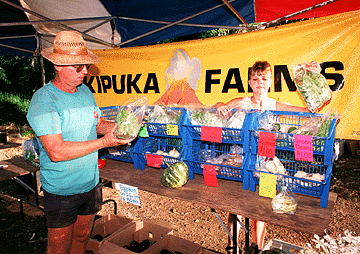
Tired of politicians setting your agenda? Get involved! For the next four weeks leading up to the Sept. 21 Primary Election, let's talk story about politics and the positive changes it can bring, just like we might do with friends sitting around the patio. Each Monday, we'll report on a community concern - and have candidates offer solutions. Then we'll open our call-in line to let you query the candidates. We'll ask some questions on your behalf and print the answers later that week.

Like many in a Big Island economy where sugar is dead and tourism is dragging, Esposito works and worries.
"Everybody seems to be struggling out here," he said.
With the island's unemployment rate declining but still above 11 percent, Esposito and others will have the economy on their minds this fall when they vote for a mayor to lead them through these hard times. Ten candidates are in the race.
Esposito isn't optimistic about any of them. "I don't know how we're going to solve something like this (economy)," he said.
First Hawaiian Bank economist Leroy Laney says Esposito's view of the economy is typical. A survey shows only a third of state residents feel things are improving.

Maxi and Steve Dias grow papayas on 10 acres on the Big Island.
They find success comes with hard work, spending as much as
16 hours a day tending their crop.
Photo by Rod Thompson, Star-Bulletin
But that hasn't meant more jobs. Hotels are earning more but not enough to justify hiring more, he explained.
Noelani Whittington, head of the Kona Kohala Resort Association and a part-time protea grower, says diversified agriculture is making money.
Dendrobium orchid growers, meeting an expanding lei market, can earn up to $175,000 a year per acre, she said.
"They'll grumble like hell and tell you they're not making any money, but look at the new car in the garage," she said.
But success is spotty. "For the average guy looking for a job, guaranteed he's having a tough time," she said.
That fits Esposito, 47, a carpenter until a back injury pushed him to return to college for a psychology degree.
"I figured when I was through with school, I'd be making some good money. It doesn't work that way in Hilo," he said.
Now working a full-time counseling job and a second part-time one while living in the rural Puna house he's been building for 12 years, he still can't keep up with clothing costs for his four children. They wear out a pair of shoes in four months, he said.
Robert Kakalia, 23, who graduated from UH-Hilo last year with a degree in business, is delivering newspapers for a living and disgusted with the economy.
David Cabarloc has a secure job as a Hilo mailman but worries about his children. "There's no life after high school already," he said. "I want them to move. There's nothing here."
At Waikoloa Beach Resort, Judy Jennet employs 40 people at her ocean recreation company. While they all work second and third jobs, Jennet gets new applications from job seekers.
She has no children. "We can't afford it," she said.

Terry McGhehey and daughter Becca Rice set up a roadside fruit and vegetable stand to sell their crops. "I think we've bottomed out," Terry said of the Big Island's ecomomy. "We're slowly heading up."
Photo by Rod Thompson, Star-Bulletin
But he didn't even get an answer to his state and county job applications. He applied for hotel jobs but was told hotels don't want a former union leader.
Ignacio considered commercial fishing, but he couldn't catch enough to pay for gas for his boat.
He wanted to raise sheep and goats or grow taro, but couldn't get land.
His wife's half-time job as a school cafeteria worker and help from their four grown children keep the family afloat.
Others are succeeding with hard work. Former Hamakua Sugar assistant superintendent Steve Dias, 48, and his wife, Maxi, have 10 acres thriving with papayas and other crops.
But it means working up to 16 hours a day and Dias giving up his passion for hunting.
Terry McGhehey also makes a living off the land, growing corn on 45 leased acres near Keaau.
He has no problem selling his corn to stores in the winter, but mainland corn is cheaper in the summer, so McGhehey set up a roadside fruit and vegetable stand to market his crops.
He sees better times coming. "I think we've bottomed out and we're slowly heading up."
He'd like to see candidates who help. "I'd like to see someone who's more oriented toward creating things than to stymieing things."